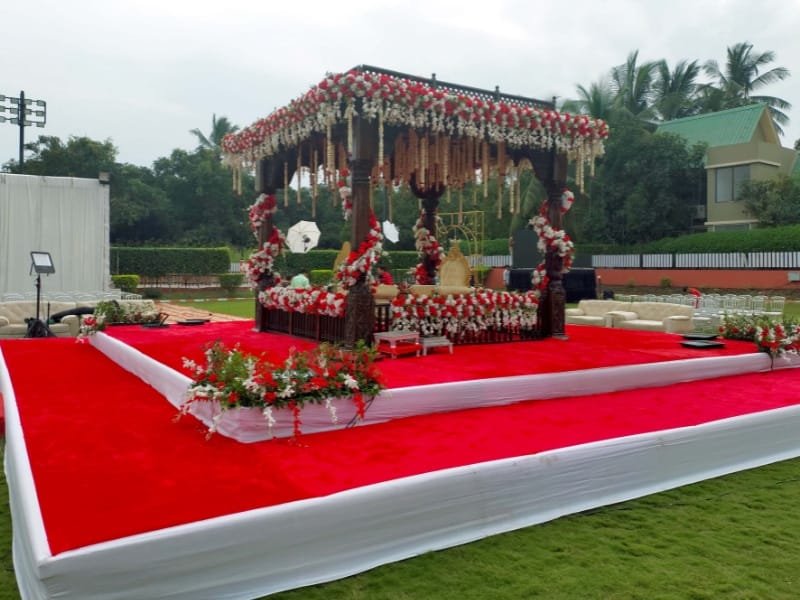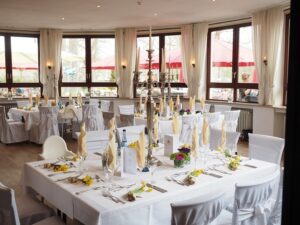Are you on the hunt for the perfect events venue? Look no further! In this comprehensive guide, we will walk you through the essential steps in selecting the ideal space for your next event. Whether you’re planning a wedding, corporate gathering, or a special celebration, choosing the right venue is crucial to ensuring a memorable and successful occasion.
With the myriad of options available, it can be overwhelming to make the right choice. That’s why we’ve put together this ultimate guide, packed with expert tips and insider knowledge to simplify the process. From considering your budget and guest count to assessing the location and amenities, we cover it all.
We understand that every event is unique, so we’ll discuss different types of venues, from charming rustic barns to modern art galleries, and help you identify the one that aligns with your vision and requirements. Along the way, we’ll provide practical advice and answer frequently asked questions to help you make an informed decision.
Get ready to find the perfect events venue that will meet your every need. Let’s dive in!
Importance of choosing the right events venue
Choosing the right events venue is crucial as it sets the tone and atmosphere for your event. The venue is like a blank canvas that can enhance the overall experience and leave a lasting impression on your guests. It can make or break the success of your event.
First and foremost, you need to consider the type of event you’re hosting. Is it a formal corporate event, a lively wedding reception, or a casual birthday party? Each event has different requirements, and the venue should reflect the theme and purpose of your event.
Secondly, the venue should accommodate your guest count comfortably. It should have enough space for everyone to move around, mingle, and enjoy themselves. It’s essential to consider the seating capacity, layout options, and any additional spaces you may need, such as a dance floor or stage.
Another important factor to consider is the location of the venue. Is it easily accessible for your guests? Does it have ample parking or public transportation options nearby? Depending on the nature of your event, the venue’s location can be a make-or-break factor.
Factors to consider when choosing an events venue
Determining your event requirements is the first step in finding the perfect events venue. Start by creating a checklist of your must-haves and nice-to-haves. Consider factors such as the event date and time, budget, guest count, and desired ambiance.
The event date and time will determine the availability of venues. Popular dates and peak seasons may require booking well in advance. It’s crucial to have flexibility in your event date or consider alternative days if your desired venue is not available on your preferred date.
Next, consider your budget. Determine how much you are willing to spend on the venue rental, catering, decor, and other event-related expenses. Keep in mind that the venue cost is often a significant portion of your budget, so it’s essential to allocate your funds wisely.
Guest count is another critical factor to consider. Make sure the venue can comfortably accommodate all your guests without feeling overcrowded. You may also need to consider additional spaces for specific activities like a cocktail hour or a separate area for children.
The ambiance of the venue sets the mood for your event. Think about the desired atmosphere you want to create. Do you prefer a formal and elegant setting or a more relaxed and casual vibe? Consider the interior design, lighting, and overall aesthetics of the venue.
Determining your event requirements
Once you have determined your event requirements, it’s time to start researching and shortlisting potential venues. to do that look into momenttuns to find event venues and or event vendors, but don’t limit yourself to online searches. Reach out to friends, colleagues, and event planning professionals for recommendations.
Start by creating a list of venues that match your criteria. Visit their websites, social media pages, and read reviews from previous clients. Look for photos and videos of events held at the venue to get a better sense of the space and its potential.
Contact the venues on your list to gather more information. Ask about availability, pricing, packages, and any additional services they offer. It’s also a good idea to request a site visit to see the venue in person and get a feel for the space.
During the site visit, pay attention to the venue’s cleanliness, maintenance, and overall condition. Assess the layout and flow of the space, imagining how it will work for your event. Take note of any restrictions or limitations that may affect your plans.
Researching and shortlisting potential venues
Visiting potential venues is an essential step in the selection process. Schedule appointments to tour each venue and meet with the venue coordinator. This will allow you to ask specific questions, discuss your event requirements, and address any concerns.
When evaluating venues, consider the following aspects:
1. Space and layout: Is the venue spacious enough for your guest count? Does it offer different layout options to suit your event’s needs? Ensure that there are enough restrooms, storage areas, and any additional spaces you may require.
2. Amenities and facilities: Check if the venue provides essential amenities such as tables, chairs, linens, and audiovisual equipment. If not, find out if they have partnerships with vendors who can provide these items.
3. Catering options: If the venue offers in-house catering, request a tasting session to sample their menu. If outside catering is allowed, inquire about any restrictions or additional fees. Ensure that the venue has a proper kitchen or food preparation area.
4. Parking and accessibility: Consider the convenience of parking facilities for your guests. Is there ample parking space or nearby parking options? Evaluate the venue’s accessibility for guests with disabilities.
5. Acoustics and sound system: Test the acoustics of the venue, especially if you plan to have live music, speeches, or presentations. Inquire about the availability and quality of the venue’s sound system.
Visiting and evaluating venues
Once you have narrowed down your options and found the perfect events venue, it’s time to negotiate and finalize the contract. Before signing any agreement, carefully review the terms and conditions, including the rental fee, payment schedule, cancellation policy, and any additional fees or services.
Negotiate with the venue coordinator to ensure that you get the best possible deal. You may be able to negotiate on the rental fee or add-ons such as extra hours, special decor, or discounted rates for additional services. Be clear about your expectations and discuss any special requirements you have.
After reaching an agreement, ask for a written contract that outlines all the details and terms discussed. Read through the contract carefully and seek legal advice if necessary. Once you are satisfied with the terms, sign the contract and make the required deposit to secure your booking.
Negotiating and finalizing the contract
With the venue secured, it’s time to plan for logistics and setup. Create a detailed event timeline and checklist to ensure that everything runs smoothly on the day of the event. Coordinate with the venue coordinator and other vendors to finalize setup and teardown schedules.
If the venue allows, schedule a walk-through with your event planner, decorator, or audiovisual team to discuss the setup requirements. Determine the placement of tables, chairs, staging, and any additional equipment. Take note of any restrictions or guidelines provided by the venue.
Communicate with the venue coordinator about load-in and load-out procedures. Determine the time when you can start setting up and when you need to vacate the venue after the event. Make sure you have enough time for setup and teardown, considering any restrictions or noise ordinances.
Ensure that all necessary permits, licenses, and insurance requirements are met. If alcohol will be served, make sure you comply with local laws and regulations. Discuss any restrictions on decorations, signage, or other event-specific elements.
Planning for logistics and setup at the venue
On the day of the event, ensure that you have a designated point of contact at the venue for any last-minute questions or issues. Communicate with your vendors to ensure they arrive on time and are familiar with the venue’s layout and rules.
Arrive at the venue early to supervise the setup and ensure that everything is in place. Conduct a final walkthrough to check that all the arrangements are as planned. Test the audiovisual equipment, lighting, and sound system to avoid any technical glitches during the event.
During the event, keep an eye on the venue to ensure that everything is running smoothly. Address any issues or concerns promptly, and communicate with the venue coordinator or on-site staff if necessary. Be prepared for unexpected situations and have backup plans in place.
Ensuring a smooth event execution
After the event, take the time to evaluate the venue and the overall experience. Assess whether the venue met your expectations and if there were any areas for improvement. Provide feedback to the venue coordinator, highlighting the positives and any suggestions for future events.
Share your experience with others by leaving a review on the venue’s website or social media pages. This will help future event planners make informed decisions. If you were happy with the venue and its services, consider recommending it to others in your network.
Post-event evaluation and feedback
Choosing the perfect events venue is a critical step in planning a successful event. By considering your event requirements, researching potential venues, and evaluating them based on various factors, you can find the ideal space that meets your vision and needs. Negotiate and finalize the contract, plan for logistics and setup, and ensure a smooth execution on the day of the event. Don’t forget to evaluate the venue and provide feedback for future events. With this ultimate guide, you’re well-equipped to find the perfect events venue that will make your event a memorable one.
Conclusion
Before diving into the venue selection process, it’s essential to understand the specific needs and budget for your event. Take some time to evaluate the purpose, theme, and size of your gathering. Are you hosting a small intimate affair or a large-scale extravaganza? Will you need additional space for vendors or entertainment? Determining these factors will help you narrow down your options.
Once you have a clear understanding of your event needs, it’s time to establish a budget. Allocating a realistic amount for the venue will guide your decision-making process and prevent overspending. Remember to factor in other costs such as catering, decorations, and any additional services you may require. By setting a budget upfront, you’ll have a better idea of what venues are within your reach.
Finally, find your best events venue here in momenttuns marketplace.
Follow momenttuns in Linkedin and facebook in order to get most advanced tips and latest events.
Do you want to promote your next event for free? Do it Here
Online Marketplace for events suppliers Momenttuns is a registered trademark







